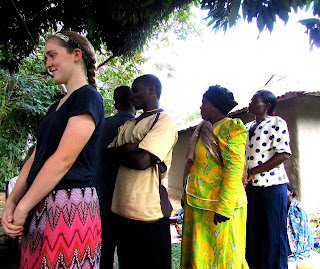This morning we woke up to a scene we have come to know,
love, and associate with our new home: roads of red, African dust that blows up
in clouds of dust that coat us head to toe in a layer of filth. Tonight on the
other hand, as I write this blog post, I am incredibly happy to say that the
sound of much-anticipated rain is providing a sweet, melodic background to the
usual buzz of the house. We interns are pleased to say that we played an irrefutably
vital role in the bringing of this liquid hope… but I’ll get to that a little
later.
We started the
day by accompanying Edwin to a reflection meeting of 11 leaders representing
different HIV/AIDS support groups. In Mumias, when a person is identified as
HIV positive, they are incorporated into a hospital support group where they
are educated on how the virus causes AIDS, what it means to live with a
threatened immune system, and adherence to anti-retroviral therapies (ARTs). In
addition to learning this important information, they are welcomed into a community support group
where they will be included, accepted, and loved for the rest of their time.
These support groups are, in every sense of the word, a family. Members remind
each other to take their medication, give each other tips on how to eat
nutritiously, and most importantly, provide undying emotional support. As
Steven, the chairperson of Khaunga support group that we visited a couple days
ago said, “birds of a feather flock together, and we are so lucky to have found
our flock.”
The meeting
started off high energy with singing, dancing, and clapping: a wonderful custom
that has come with every meeting we’ve been invited to thus far. The attendees,
who had all been recently trained in public speaking, then took turns
discussing each of their personal achievements. Most of the stories included
personal tales of one-on-one interactions with members in the community who
were either too afraid to get tested or did not find it worthwhile to get
treated. In each of these stories, the individual investment of the support
group leaders provided these people with a drop of hope, sending out ripples of
resilience, strength, and ultimately self-acceptance. The Ambassadors of Hope
were able to bring these community leaders together and provide them with a
resounding voice that has reached countless people living positively in Mumias.
They also identified common challenges that include: fear of knowledge of
status, aversion of condom use, scarcity of female condoms, and fear of
disclosure.
After lunch
we went to visit one of the leaders we had meet at the meeting, Ruth, for an
Ichengo support group meeting. This time we were allowed to sit back and
observe how a normal meeting goes, or at least as normal as possible with a
group of mzüngu visitors present. Today’s topic was partner and family testing
and the setting was evocative of an outdoor classroom. We were all seated in a
circle as Ruth walked around with a picture of a couple being tested for HIV
and asked “the class” what we saw. Hands shot up. At first we were a bit
perplexed by the ease of the task assigned to grown men and women. We did not
know whether this was for our benefit or truly for theirs. Ultimately, though,
it represented an inspiring sense of humility to me. These men and women were taking the time out
of their doubtlessly busy schedules for an activity at which most people back
home would scoff. The core belief of this group is that everyone is both
entitled to and has the responsibility to get HIV tested. To them, this is not
an individual fight with a virus; it is a community battle against an epidemic.
A perfect
example of this sense of unity is a practice we observed at the support group
called merry-go-round. Each meeting, every member puts 20 shillings into a
bowl. All of this money then goes to a different member each week and this
member is free to use the money as a sort of microfinance, for example to buy
seeds for a garden. This demonstrates a sentiment common back in the United States:
“the whole is greater then the sum of its parts,” and a word in Kiswahili,
moja, that means both ‘unity’ and ‘one.’ The cultural value of unity is
something that we have witnessed over and over again and Kenya, and is
something we will all take home with us to apply to both our personal lives and
growth as members of a global health movement.
After
the meeting, we visited yet another kitchen garden full of kale, cowpeas, corn,
and other local vegetables. We had been hearing throughout all of these visits
that Western Kenya has not been receiving nearly enough rain, and that the crops
are suffering because of it. After hearing over and over again about the
importance of the gardens in providing affected families with nutrition and
income, we were devastated to hear about yet another major struggle. It reminds
us all how multi-factorial health is and how reliant it can be on things that
are completely out of our hands. So we looked up into the sky, raised our hands
above our heads with fully-fledged spirit fingers and did the only thing we
could think to do, started chanting, “kuja maji, kuja!” Come water, come!
-Alexis
 |
| Ruth explaining one of the most important of the 13 outlined messages: partner testing |
 |
| Ichengo support group |
 |
| Molly and Ichengo members participating in an educational activity |
 |
| Two Ichengo members showing off their kitchen garden |









